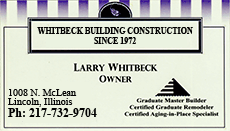|
 "Infrastructure is so key to many of the businesses that are
located in our region, and more importantly to attracting and
retaining new employers who may be looking at the region," Schock
said. "Infrastructure is so key to many of the businesses that are
located in our region, and more importantly to attracting and
retaining new employers who may be looking at the region," Schock
said.
As a member of the Ways and Means Committee, a committee commonly
referred to as "the most powerful committee in Congress," Schock
also has a hand in examining and adjusting the tax code, which as it
stands is over 70,000 pages long.
"It should not take a doctorate, or the hiring of someone with
one, just to file your taxes on time," he said.
He also added that many pages of the tax code have become
outdated and serve as competitive barriers to small business growth
and investment in the U.S.
Schock went on to illustrate the framework he had in mind for
individual tax reform: that is, reducing the six current individual
rates to two. Households making more than $30,000 but less than
$150,000 a year would pay a 10 percent rate on their earnings, and
those making above $150,000 would pay a rate of 25 percent, down
from the current rate of 35 percent.

Schock also voiced his opposition to the federal estate tax, also
known as the "death tax." The so-called death tax is defined by the
Internal Revenue Service as "a tax on your right to transfer
property at your death." Oftentimes family farms and businesses are
affected adversely by this tax, in that they must sell property in
order to pay it off. This creates obvious problems, especially in
Logan County, and Schock is in favor of an outright repeal of this
tax.
"I don't believe death should be a taxable event," he added.
The congressman continued by discussing his dissatisfaction with
the current health care law.
"I'm committed to fully repealing the fundamentally flawed and
unconstitutional health care law and replacing it with a meaningful,
common-sense legislation that will reduce the overall cost of your
health care, create affordable opportunities for Americans with
pre-existing conditions and ensure seniors don't bear the burden of
higher Medicare taxes," he said.
[to top of second column] |

Schock went on to reiterate the importance of infrastructure,
particularly in Logan County. He praised city leaders on the
completion of the new hospital, calling it "a critical hospital here
in our 18th District."
Staying on the topic of infrastructure, Schock explained his
hopes for a long-term highway bill, something he has been fighting
for since arriving on Capitol Hill. He was disappointed with the
amount of money allocated to infrastructure in the 2008 stimulus
package and would like to see more funding go toward the
construction of roads and other infrastructure programs that would
be a catalyst to the economy and create thousands of new jobs.
Schock also addressed the audience on a topic that hit especially
close to home: the Fifth Street Road project. The goal of this
project is to correct poor intersection design on Fifth Street that
has caused more than 40 traffic accidents. Lanes would be widened,
and turning lanes and storm drains would be added. He also mentioned
a bike path being added in the future. Reconstruction of this road
would provide new development and environmental benefits to the
community as a whole.
The speech was concluded with a brief Q-and-A, with questions
ranging from federal budget issues to raising the debt ceiling.

Before leaving the podium, Schock helped present the first
Community Development Award to members of the downtown steering
committee: Barbara Blackburn, David Lanterman, Bob Neal, Seth
Goodman, Marty Neitzel, Patrick Doolin and Keith Snyder, along with
Lisa Kramer and Darren Forgy of Prairie Engineers.
[By SAMUEL WOOD] |